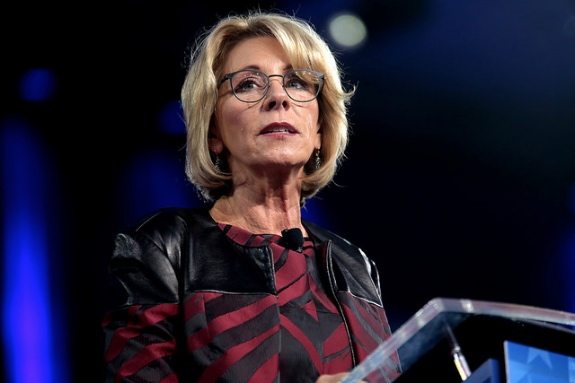
April 26, 2017; New York Times
Last week, President Trump signed an executive order directing the Secretary of Education to find ways to do just that. Within 300 days, Secretary DeVos is to identify those policies and practices that overreach and ensure that the federal government does not “obstruct the ability of states, local governments, teachers, and most importantly, parents, to make the best decisions for their students and, in many cases, for their children.”
The New York Times reports that this effort, focusing on K-12 policies, will be led by businessman Robert Eitel, who was recently hired as a senior counselor to Secretary DeVos. The Times described Mr. Eitel as “a vocal critic of regulations in higher-education and K-12 policy” whose hiring was “controversial” because he had previously worked as the top lawyer for a company accused of deceptive college lending practices.
It is unclear how the effort to diminish federal influence on public education will be reconciled with the president’s desire to increase choice—in particular, to use federal funding as a spur to move states to provide tuition vouchers. As a candidate, he proposed using $20 billion in federal funding to entice states to adopt and expand voucher programs, a strategy similar to ones he criticized when they were used by previous administrations in support of their educational priorities. Included in President Trump’s first budget proposal was a $1.4 billion allocation for vouchers that the Los Angeles Times described as a “down payment on a program that would be ramping up to an annual total of $20 billion.” So, is the president opposed to federal overreach, or just the education policies of the Bush and Obama administrations?
Sign up for our free newsletters
Subscribe to NPQ's newsletters to have our top stories delivered directly to your inbox.
By signing up, you agree to our privacy policy and terms of use, and to receive messages from NPQ and our partners.
Also yet to be known, but very important to understand, is how this process will affect what has been a core mission of the Department of Education since it was created in 1979: “to strengthen the federal commitment to ensuring access to equal educational opportunity for every individual.” From the moment that the Supreme Court in Brown v. Board of Education recognized how crucial quality educational opportunities were, educational equity has been a critical national objective. Balancing this national objective with state and local interests has never been easy or conflict-free.
On this issue, the early signs are troubling. Secretary DeVos rescinded Education Department guidance ensuring the rights of transsexual students as a matter best decided locally. Two of her early appointments placed individuals with questionable equity commitments in key positions. And her own comments to Axios suggest she does not see much need for a federal role:
I think in some of the areas around protecting students and ensuring safe environments for them, there is a role to play. […] When we had segregated schools and…girls weren’t allowed to have the same kind of sports teams—I mean, there have been important inflection points for the federal government to get involved. But are there any remaining issues like that where the federal government should intervene? I can’t think of any now.
Will a recent Alabama federal court decision, which illustrated that the Supreme Court’s promise in Brown of an equal education is yet to be fulfilled, give her reason to rethink that conclusion? The court claimed the right of parents to create a new, predominantly white school district by withdrawing from their current integrated schools. According to the Washington Post, Judge Madeline Haikala bowed to parent choice, despite finding “that the city of Gardendale’s effort to break away was motivated by race and sent messages of racial inferiority and exclusion that ‘assail the dignity of black schoolchildren.’” She also found that Gardendale failed to meet its legal burden to prove that its separation would not hinder desegregation in Jefferson County, which has been struggling to integrate its schools since black parents first sued for an equal education for their children in the 1960s.
The next 300 days will tell us whether the administration’s intent is just to reduce bureaucracy or something more malevolent.—Martin Levine













